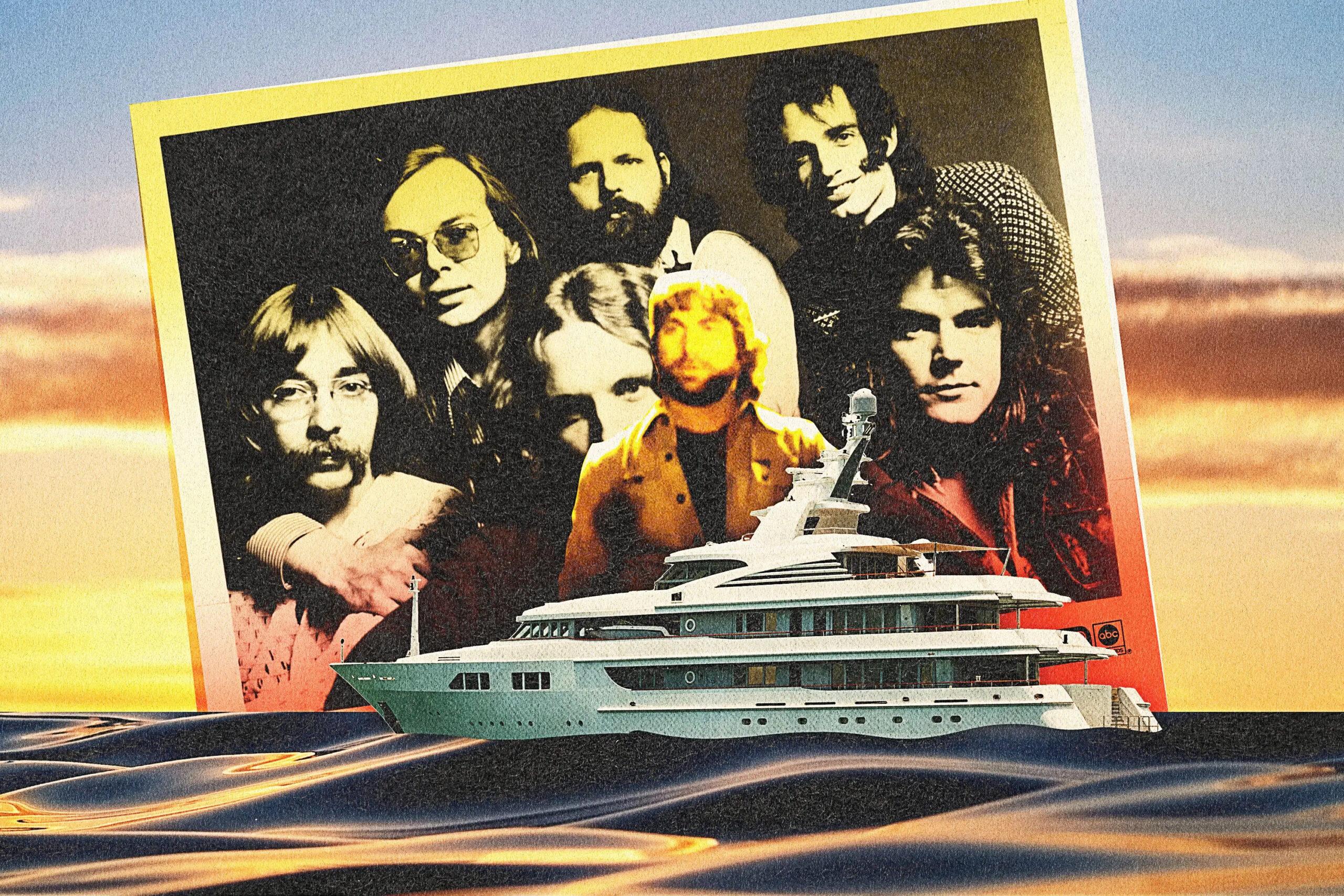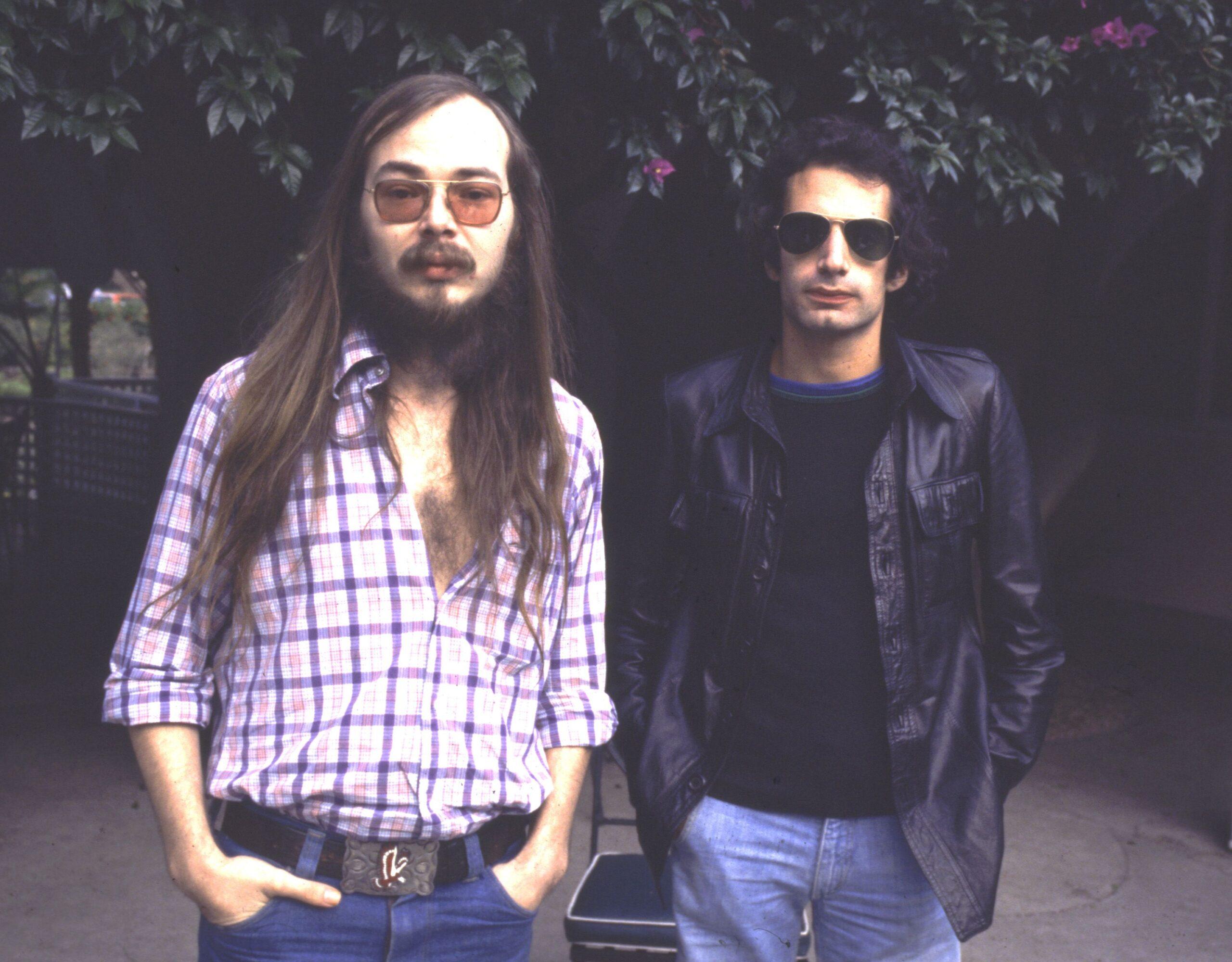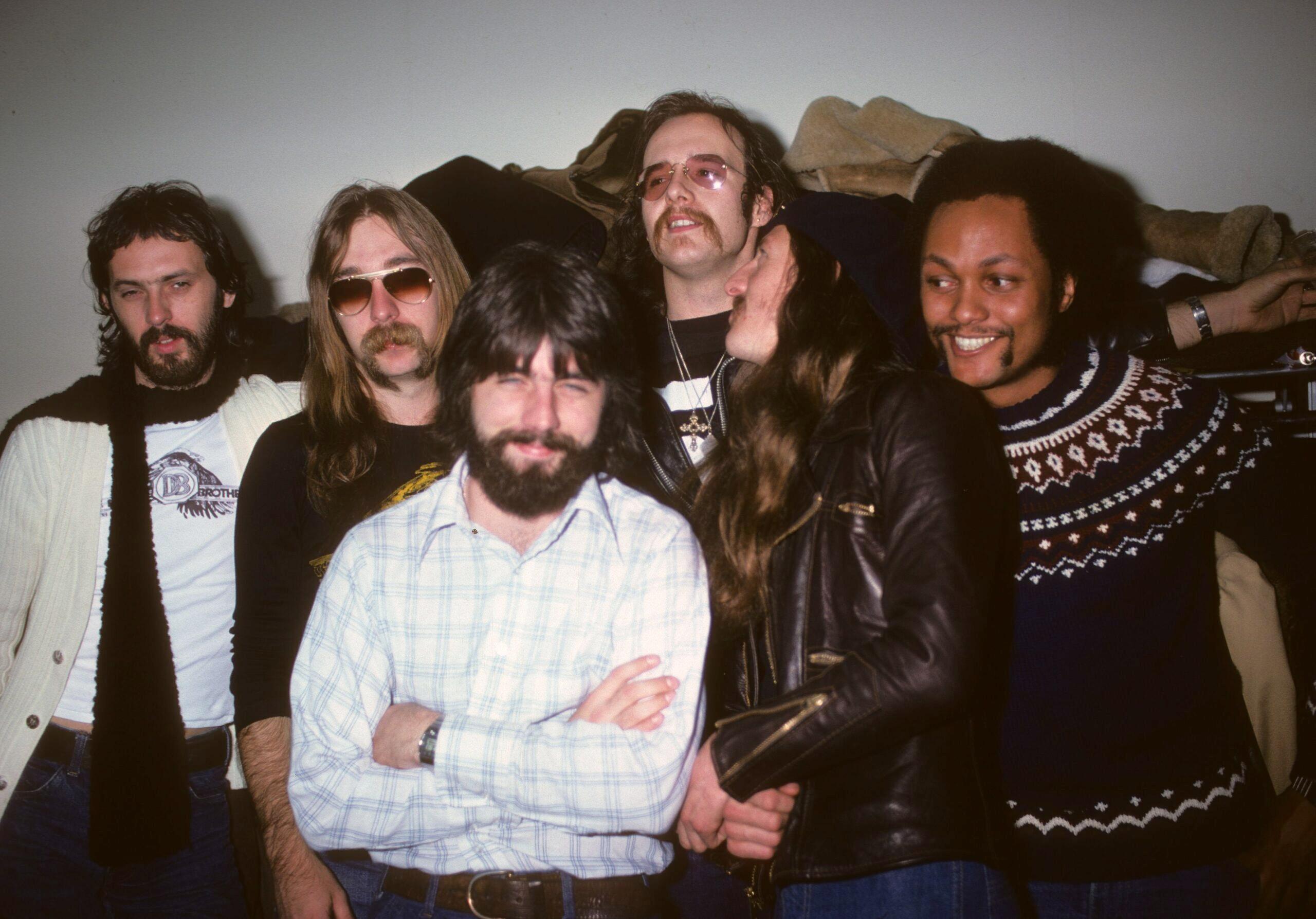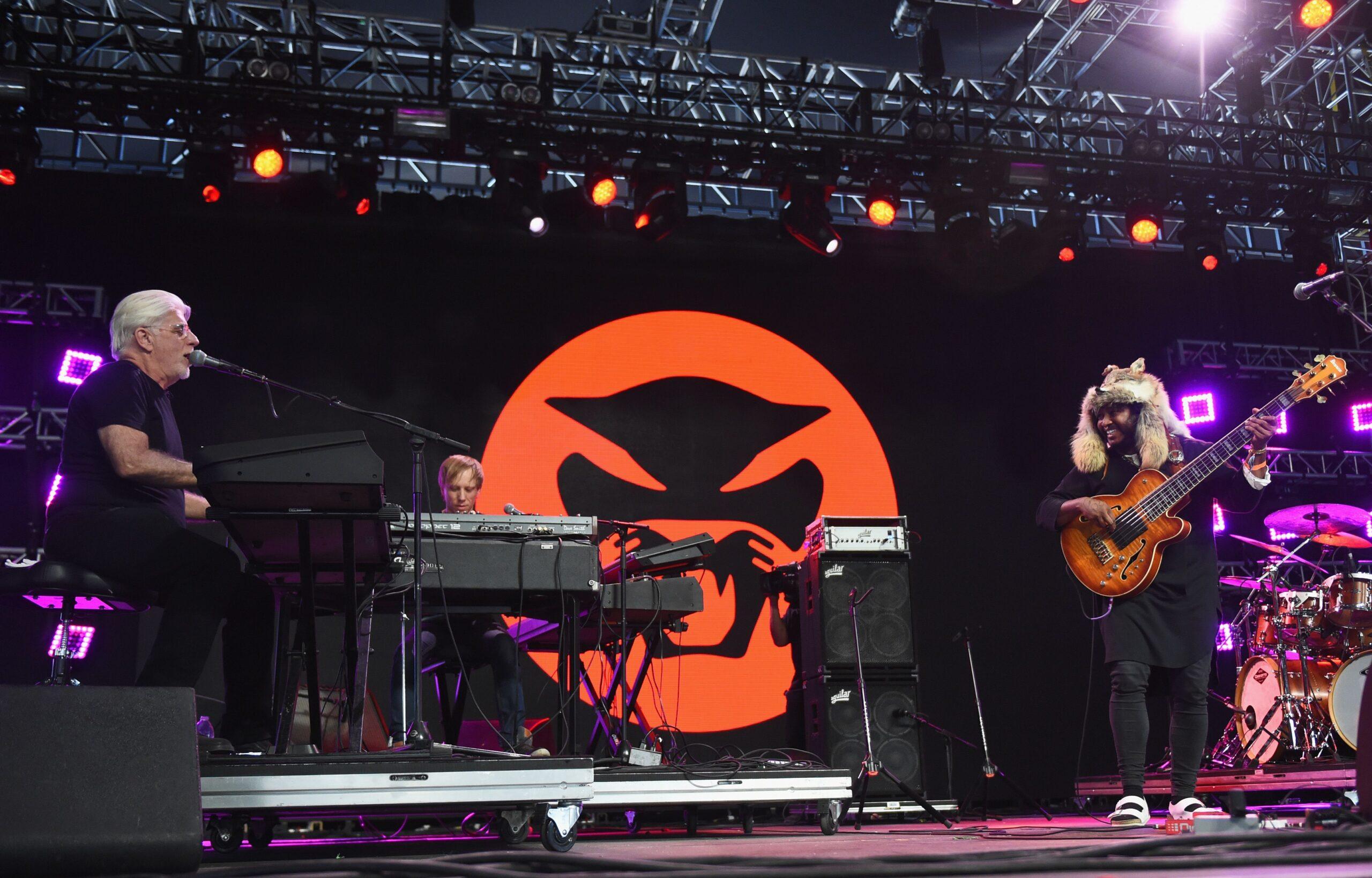
Yacht rock makes me think of hardcore pornography, and not simply because of the facial hair and cocaine-fueled excess. When I consider the soft-rock genre and what defines it, I immediately think of the Potter Stewart doctrine: “I know it when I see it.”
Such is the case when dealing with musical genres with loose definitions. A few years back, we went through this with emo, and right now, our friends over at Bandsplain are dealing with this with Britpop. But yacht rock adds an extra level of confusion. At least genres like emo and Britpop were named in the moment, even if those descriptors didn’t come from the musicians themselves. Yacht rock received the moniker retroactively—decades after mellow rock’s ’70s and ’80s heyday—and in large part because of a video web series that, early on, was spread largely through Myspace. Also important to note: Sometimes yacht rock doesn’t sound like rock at all—in practice, it often more closely resembles jazz or R&B. It can get confusing, even for the people who get tagged with the label. As John Oates, one-half of Hall & Oates, told author Greg Prato for The Yacht Rock Book, “Yacht rock to me assumes that you’re relaxing on a boat and you wear funny clothes and a captain’s hat. I really don’t even know what the hell that is.”
Despite the inauspicious origins, the name has stuck, though it’s still sometimes unclear who (or what) exactly is yacht rock. We know Toto is yacht rock, but what about the Eagles? And the members of Toto played all over Thriller, so does that mean Michael Jackson is yacht rock? What about blue-eyed soul? (And speaking of which, what exactly is blue-eyed soul?) Also, where the hell do the boats come in? With Ringer Films prepping to release Yacht Rock: A Dockumentary as part of the HBO Music Box series on Max this Friday, we thought it would be good to answer some questions, set some definitions, and guide you through some potentially choppy waters. Allow us to present to you the (Slightly Abridged) Yacht Rock Dictionary. Buckle in. Because we’re about to get hardcore about soft rock.
“Africa”: It’s appropriate that we begin our voyage into the high seas of yacht rock in Africa. Or rather, with “Africa,” the song—one of the foundational texts of the genre and the subject of one of the most ’80s videos ever made. The opus of Toto member David Paich, “Africa” was originally an afterthought—the final track on Toto’s fourth album, a track that at least one other member didn’t like. But it hit no. 1 on the Billboard singles chart in 1983, becoming a bizarre and irresistible pop song made by a group of unlikely pop stars. (Seriously, look at these guys.) Four decades later, it still lives on: through a Weezer cover, through memes, and most of all through YouTube, where you can still watch the members of Toto inexplicably playing on top of a stack of books. It’s perhaps a little insular by 2024 standards, but it’s undeniable in its earnestness: As cofounder Jeff Porcaro once said, “A white boy is trying to write a song on Africa, but since he’s never been there, he can only tell what he’s seen on TV or remembers in the past.” Let’s hope that there aren’t too many white boys who know Africa only from what they’ve seen in this video.
Aja: One of the key figures in the Yacht Rock web series once said that Steely Dan “is sort of the primordial ooze from which yacht rock emerged.” And Aja may be the most addictive form of that ooze—the purest distillation of the Dans’ mastery of groove-heavy jazz rock and studio craftsmanship. (Nearly 40 session musicians played on this record!) It’s also the album that gave us “Black Cow,” which means it’s indirectly responsible for this moment:
That alone should’ve been enough to earn it a place in the Library of Congress.
AM Gold: Think: Bread, the Carpenters, or even Neil Diamond. AM Gold is a loose genre often associated with yacht rock, but despite its luxurious name and mellow stylings, there are a few degrees of difference between the styles. First: AM Gold lacks the fluency in jazz and soul that shined through in bands like Steely Dan and the Doobie Brothers. But also, AM Gold got its name from the radio stations that kept those artists in rotation. It’s the music parents might have played in the wood-paneled station wagon on a long road trip. Yacht rock, meanwhile, was the music that they put on at night to remind themselves of why they got married in the first place.
AOR: Album-oriented rock (and not adult-oriented rock, as many assume). This sweeping genre got its name from the FM stations that would play deeper cuts to flesh out programming. AOR can be smooth or anthemic—it’s maybe even more amorphous a term to define than yacht rock. But if you’re in doubt about the difference, just know that Steely Dan once penned an indirect diss song to the genre—or at least the radio stations that played it—in the form of “FM (No Static at All)”: “Give her some funked-up Muzak / She treats you nice / Feed her some hungry reggae / She’ll love you twice.” Just trust me, in 1978, this hit as hard as “Certified Lover Boy? Certified pedophiles.”
Beach Boys, the: Not yacht rock nor surf rock—that’s a whole ’nother, gnarlier thing; don’t get involved—but the Beach Boys remain a touchstone for the genre largely because of finely crafted works like Pet Sounds and Surf’s Up. But Brian Wilson and crew also make this dictionary for another reason: They gave a start to a young Daryl Dragon, better known as the Captain from Captain & Tennille. (And, yes, Daryl Dragon is indeed his real name, and, yes, that means “the Captain” is somehow a name downgrade.) Crucially, his time with the Beach Boys is also when Dragon began wearing his famous hat—which he started doing to cover thinning hair in his 20s. “I must confess,” he says in Greg Prato’s book. “I’m a phony captain—no boat.” Still, someone has to steer the proverbial ship, and someone has to teach that person how to do it. Who better than some sad-boy surf dudes who know their way around a studio?
Bell bottoms: The phrase “’70s yacht rock” probably conjures thoughts of polyester suits or horizontal-pin-striped shirts, but the reality is a lot of these dudes were studio rats. We’re talking about people whose idea of good style was tossing a captain’s hat atop a growing bald spot. We’re not exactly talking fashion icons. Except, well …

Maybe we are.
Blue-eyed soul: Another yacht-rock-adjacent micro-genre that admittedly sounds cooler than “AM Gold” but also seems to piss people off more than any of these made-up names. (Daryl Hall and John Oates are both on the record as calling the phrase racist.) Still, in a more favorable light, it’s easy to see it as a compliment—the music of people like Bobby Caldwell and Michael McDonald worked its way into the rotation at Black radio stations, and it’s hard to hear a song like “What You Won’t Do for Love” and think of any other way to describe it. Also, it could be worse. It’s not like we’re calling them white rappers, right?
The Blue Jean Committee: A fictional group comprising Clark Honus and Gene Allen (Bill Hader and Fred Armisen, respectively) that was the subject of the two-part Documentary Now! spoof “Gentle and Soft: The Story of the Blue Jean Committee.” It’s a loving homage to ’70s lite rock, centered on two guys who made some of the sweetest music never known to man and were predictably totally aggro behind the scenes. But most importantly, they even got the Kenny Loggins cosign: “I was completely blown away by that record,” says Loggins of their would-be seminal album, Catalina Breeze. “We all tried to capture that thing, but they really got it. That was the quintessential California record.”
It’s a joke, but it’s also kinda not, because you can buy their records right now (courtesy of Drag City). Besides, Armisen has a history of taking things the appropriate amount of seriously.
Buffet, Jimmy: “We hate Jimmy Buffett,” says Yacht Rock web series host “Hollywood” Steve Huey in Greg Prato’s book. “Fucking hate that guy.” We assume he’s talking about the music of the late mayor of Margaritaville, not the person, but it tracks. Buffett’s music was simple, countryish fare that bore little resemblance to the more complex, high-touch stuff being made by Walter Becker and Donald Fagen or the guys in Toto, and Buffett’s target demo appears to be “the guy in the corner office who wants to get drunk in a Hawaiian shirt.” Sorry, Parrotheads, but you won’t be getting an invite to the yacht. (See also: Holmes, Rupert.)
City pop: Japan’s answer to yacht rock, and I swear I’m not just making up genres right now. I’ll give city pop this, however: Not only are the bass lines thick and the synths bouncy but there are also a lot more women here than on the yacht, so it feels more like a proper party and less like a bro-down.
Cross, Christopher: On the surface, Christopher Cross seems to bear only a passing similarity to classic yacht rock—there’s no jazz or R&B influence, and he admittedly favors his guitar over the electric piano. Also, having an on-the-nose song named “Sailing” isn’t typically enough to grant you entry to the genre. But there’s something undeniable about Cross’s music that gives it a pass. But while the man is responsible for yacht rock’s greatest triumph—a Grammys sweep that’s been repeated only by Billie Eilish!—he’s still something of a controversial figure here and the subject of the occasional r/yachtrock post like “Touching the third rail: Why is ‘Sailing’ yacht rock?” Reality is: If the wind is right, anyone can sail away.
Cocaine: Look, it was the ’70s. It would be more shocking if this entry weren’t here, right? Luckily, for most yacht rock practitioners, the party did eventually end. “When the ideas had dried up, when it was no longer, ‘Sniff, write, sniff, write,’ and it became, ‘Sniff, sniff, sniff, sniff,’ I said, ‘OK, this is no good anymore,’” Rick Roberts of the Flying Burrito Brothers and Firefall told Greg Prato.
Cover bands: A maybe not-so-fun fact: I once dated an otherwise regular girl who was obsessed with a tribute band named Yächtley Crëw, a SoCal group that would wear cruise captain outfits and play “Baby Come Back.” She basically followed them around dressed in similar garb. On paper, she was great—exceedingly nice, great job, etc.—but it didn’t work out. (Probably for other reasons, but also possibly not.) But she occasionally pops up in my Instagram feed wearing sailor caps with her new man, and I couldn’t be happier for her. We can all only hope to find our shipmates on these rough seas. (See also: Yacht Rock Revue, Sausalito, Yachty by Nature.)
Dollar bin, the: The final resting place for many classic yacht rock LPs. As a former crate digger, I cannot count the number of times I had to flip past Boz Scaggs’s Silk Degrees. (Though, admittedly, the break on “Lowdown” still goes hard.)

Doobie Bounce, the: A description of the classic, often-syncopated Doobie Brothers sound best exemplified by the pinnacle of the yacht rock genre, “What a Fool Believes.” It’s got elements of the Motown Shuffle with a touch of an upbeat Latin groove—deceptively complex stuff for such a catchy song. The Doobie Bounce was also the inspiration for a Yacht Rock Revue original song, which features lyrics such as, “Keeping up is overrated, it gets too complicated / I’d rather have some fun.” And that doubles as a nice mission statement for this whole excursion, don’t you think?
Eagles, the: The biggest of the many bands that grew out of the Laurel Canyon scene, the Eagles often get grouped into the genre. Despite being an L.A.-based, soft-rock juggernaut, Don Henley, Glenn Frey, and the boys are more of a country-rock concern. There’s a reason they were one of the (fictional) villains of the famed Yacht Rock web series, seen here giving noogies to the (fictional) Donald Fagen and Walter Becker. Maybe the Dude was on to something.
Electric piano: Often a Rhodes, often the defining element of any good yacht rock song. A silky-smooth instrument to match a silky-smooth genre.
Fleetwood Mac: Again, another group of soft-rock titans that gets lumped into the genre despite having few of the threads commonly associated with it. Admittedly, however, I wouldn’t be mad if we were to classify Tango in the Night as post-yacht rock (if I can invent another dubious, impossible-to-define subset right now). Still, we’d be remiss if we didn’t call out one perfect song that I don’t find out of place on yacht rock playlists: “Sugar Daddy” from 1975, which boasts a sick groove, a sick Christine McVie electric piano, and a subject matter that feels all too appropriate for a style of music that boomers love.
“Footloose”: Perhaps no one parlayed the genre into greater success than Kenny Loggins, who was the soundtrack guy for a stretch of the ’80s. Over the Top, Top Gun, Caddyshack—there’s a reason this guy was called the Soundtrack King. The king’s crown jewel is, naturally, the theme song to Footloose—his only no. 1 hit, an entrant on the AFI’s 100 Years ...100 Songs, and part of the Library of Congress collection. All this off of soundtracking some white-boy breakdancing.
Fool(s): In this genre, everyone’s a fool. We know what they believe, but what about what they say? While some like to believe they’re nobody’s fool, most yacht rockers aren’t afraid to be one, even repeatedly. They might even be one for you—and they may even find their way to paradise for doing so. And, hey, being something is always better than nothing, even if that something is simply being a fool.
Hip-hop: An unlikely kindred spirit with yacht rock thanks to a few factors—chiefly the thick grooves and the frequent appearance of yacht rock LPs in dollar bins, both of which make it a sampler’s secret weapon. Yacht rock has provided the background for more classics than you’d probably believe: Kanye West’s “Champion,” MC Lyte’s “Poor Georgie,” De La Soul’s “Eye Know,” and a big one we’ll get to in a few entries. Also, this gives us one more chance to post this video …
Forget the Library of Congress; put it in the Louvre. (And definitely put it in the Steely Dan bank account.)
Houston Oilers, the: No yacht rock dictionary is complete without a shout to the powder-blue Earl Campbell jersey that Christopher Cross wore on The Midnight Special.
Again, allow me to retract my previous statement about there being no style icons in this genre.
“I Keep Forgettin’ (Every Time You’re Near)”: As a member of the Doobie Brothers, Michael McDonald penned what is perhaps the genre’s apex in “What a Fool Believes.” As a solo artist, the velvety-voiced singer penned what may be its most enduring hit. That’s partly because of the second life it took on. If you’re aware of this song, you’re undoubtedly aware of Warren G’s sample flip of it for “Regulate,” the 1994 smash-hit collab with Nate Dogg that lands on the short list of the best L.A. rap songs ever made. Even McDonald agrees: “There’s great stuff that’s taken the genre to a new level over the years, and ‘Regulate’ was one of those tracks,” he told Billboard a few years back. Unfortunately for us—though maybe fortunately for McDonald—there’s no Steely Dan–style video of him rapping the updated hit.
Jones, Quincy: Since yacht rock took influences from jazz and R&B and leaned heavily on studio craftsmanship, it only makes sense that a jazz musician turned R&B super-producer would become one of yacht rock’s most fervent proponents. You hear it in the songs Quincy produced for the likes of George Benson, Patti Austin, and James Ingram—examples of another mostly made-up genre called “yacht soul”—but also in his production masterwork, Thriller, which enlisted the members of Toto to pull off some of its biggest moments. Listen to songs like “Human Nature,” “The Girl Is Mine,” and “The Lady in My Life” and tell me you don’t hear pure, unadulterated yacht rock.
Majestic plumage (hairstyle): If I had a time machine, I’d go back to 1976 and buy as much Vidal Sassoon stock as I possibly could.
MTV: If video killed the radio star, then it also killed the yacht rock star. But it’s not because these guys weren’t good-looking—Hall & Oates, who may or may not be yacht rockers but often get lumped in, are a couple of pretty dudes. That death came largely because of shifting tastes. “MTV was playing, like, the Clash and things like that,” Robbie Dupree says in Greg Prato’s book. “And then the hair bands came along, and they took over. The substance went away, and MTV went trashy. And then it was strippers and Van Halen, and that kind of vibe became the thing.” I’m not sure “Steal Away” could have ever competed with “Jump” with or without MTV, but I’m also not sure I would’ve wanted to see Robbie Dupree swap out the bell bottoms for spandex. Either way, by the time I came of age in the ’90s, both Robbie and Van Halen had made their way to their rightful home: VH1.
Numero Group: The great reissue label that’s put out compilations such as Seafaring Strangers and rescued long-lost Ned Doheny songs from the cutting room floor. Proof that no matter how long you’ve traveled the ocean, there’s still treasure to find. (And also proof that you don’t need to go broke on Discogs to get your hands on some classics.)
Punk: Do you think any yacht rockers were even aware that the Sex Pistols were happening at the same time? I like to think they were blissfully unaware of the movement, just breezing through life and figuring out how not to be a fool. (Also, as Hollywood Steve makes a point of noting in Greg Prato’s book, “It’s important to realize that just because the song is about sailing, it does not make it yacht rock. Like Bad Brains’ ‘Sailin’ On’—that is not a yacht rock song.” We knew, but now that you’ve raised the issue, we need to hear a Yächtley Crëw cover.)
SCTV: If you think McDonald’s name has popped up a lot in this dictionary, then you should spend some time with the liner notes of ’70s and ’80s soft-rock albums. Dude was the hardest-working man in yacht rock—something that the Canadian sketch-comedy show SCTV paid homage to in this sketch, which features Rick Moranis as McDonald racing from studio to studio to lay down backing vocals.
Thankfully, it was the sketch—and not the workload—that once made McDonald feel like he was having a mental breakdown.
Session players: The crew of any good yacht. It’s the label slapped on the master, hired-gun musicians who go from gig to gig laying down the best instrumentation you’ve ever heard. Rupert Holmes told Greg Prato he made four albums with session players before ever piecing together a proper band, while Steely Dan turned what could’ve been faceless grunt work into something to aspire to. In fact, many session musicians became legends in their own rights: Drummer Steve Gadd is a god to many, the Porcaros found great success with Toto and Thriller, and John Hall (not to be confused with Daryl Hall or John Oates) went on to form the band Orleans and eventually win a seat in Congress. It’s proof that sometimes great power comes from behind the scenes, and sometimes you don’t need to be at the front of the ship to be the captain.
“Summer Breeze”: The Seals and Crofts hit. It’s perhaps more proto-yacht rock, and, yes, now we’re firmly in made-up-title territory.
Soul Train: OK, let’s take a way-too-earnest timeout. It’s easy to poke fun at some of this stuff and point to the influence of Black music on white musicians, but when you see Michael McDonald next to Don Cornelius on the legendary Black music show as Cornelius says, “We love your music—always have,” you understand that it’s deeper than any meme or half-baked genre label can convey.
“Sweet Freedom”: If Michael McDonald is responsible for the pinnacle of yacht rock, then it’s appropriate that he’s also responsible for its possible swan song. This track off the Billy Crystal–Gregory Hines buddy-cop comedy Running Scared is, as Ringer head honcho and Yacht Rock: A Dockumentary executive producer Bill Simmons argued recently on The Rewatchables, basically the end of the genre. Though if yacht rock had to go out, at least it got to go out with a velvety-voiced crooner and Gregory Hines wearing a Walter Payton jersey. Let’s hope all of our funerals have a touch of the Doobie Bounce.
Thundercat: The standard-bearer for modern-day yacht rock, which is appropriate given he got his start as, essentially, a session player. The Los Angeles bassist—and onetime Suicidal Tendencies member—rose to fame (as much as a bassist can) for his work with Mac Miller and Flying Lotus and on Kendrick Lamar’s To Pimp a Butterfly. His solo work, however, is less hip-hop or electronic and more of the progressive jazz variety. Naturally, this impressive musicianship led him to the yacht rock dock, where he set sail with Kenny Loggins and Michael McDonald for “Show You the Way” in 2017. The song—which led to McDonald cameo at Coachella—is proof that the genre doesn’t need to simply be a nostalgia play or a cheap gimmick to draw people to DJ nights at small bars. It can be a living, breathing thing, so long as you can keep your head above water.

West Coast sound: Also known as the California sound. The original name for this genre and, despite being tied to a pretty big geographic region, one that feels fairly specific to me. Because let me tell you, they ain’t making shit like this in Kansas. (Also, while we’re here: Kansas—decidedly not yacht rock.) Being from Los Angeles doesn’t automatically make a band yacht rock, but proximity to water certainly does help. You don’t need a boat, but you do need a vibe.
Women: Let’s face it: This was a dude-heavy genre. A quick look at any yacht rock playlist will make you wonder whether these guys have ever even met a woman, despite what they sing about. But I’m here to tell you that women indeed did make music that fits into the style, whether or not they get the credit they deserve: Linda Ronstadt, Nicolette Larson, Patti Austin, even some Olivia Newton-John. They all slot right in next to Rupert Holmes or Player or any of the bearded bros we’ve been discussing. (Also: shout-out to “Why” by Carly Simon, which for my money is in the running for best yacht rock song ever made.)
Yacht or Nyacht?: Still confused? There’s a website out there that will tell you whether that soft-rock classic you’re listening to is actually yacht rock. Created by some of the people behind the Yacht Rock web series, it uses the patented (and extremely arbitrary) Yachtski scale to determine that songs like “Heart to Heart” are near-perfect examples of the style, while the Eagles are somehow the least yacht rock people on the planet.

Even below Bad Brains. Yacht rock feuds may be as made-up as the genre itself, but they do die hard.
Yacht Rock (web series): The web series that gave this wonderful genre its bizarre name. Created by J.D. Ryznar, Hunter D. Stair, and Lane Farnham and hosted by “Hollywood” Steve Huey, the 12-episode series started in 2005, when it was spread through Myspace links and other platforms that feel even older than the music now. Each installment would tell a fictionalized account of some of the genre’s heroes (Steely Dan, the Doobies) and villains (the Eagles, of course).
These episodes were hilarious, they were absurd, and they were educational, and if you were a certain type of music fan who loved irony in the mid-2000s, they were mega-viral in a way that feels quaint in 2024. It doesn’t matter if they were largely apocryphal or that some musicians hated the series—according to Kenny Loggins, Daryl Hall especially despised it. These videos launched a thousand ship-based cover bands. Of course, it was Michael McDonald who summed it up best in Time Out magazine in 2008: “I thought Yacht Rock was hilarious. And uncannily, you know, those things always have a little bit of truth to them. It’s kind of like when you get a letter from a stalker who’s never met you. They somehow hit on something, and you have to admit they’re pretty intuitive.”
Yacht Rock: A Dockumentary: Ringer Films’ new HBO documentary debuting Friday on Max. Plant your anchor on the couch and fit it in during your post-Thanksgiving malaise or between football this weekend. Or even later—it’s not going anywhere, just like this genre, somehow.
Yachts: All of these words and not one goddamn real boat in sight. Who’s the captain around here, anyway?

